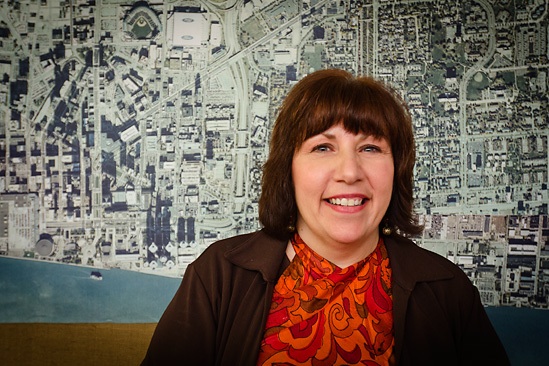Editor's Note: Any opinion expressed in this story is to be considered his/her own personal opinion, not the opinion of this website's managers, director or editor.
DETROIT—Cheryl Simon, coordinator of the Detroit Food Policy Council, who grew up in Detroit until age 11, has been involved with food issues in the city for 23 years.
When she moved back to Detroit in 1989, she was looking for ways to re-engage in her hometown. She volunteered for Focus Hope delivering a monthly food box to an elderly couple in Jeffries Homes. It was her first personal experience with the huge gap between people who had resources and access to good food and people who didn’t.
Mode Shift spoke with Simon on Nov. 14 about food system issues in Detroit.
 MODE SHIFT: What do you believe food sovereignty should look in Detroit?
MODE SHIFT: What do you believe food sovereignty should look in Detroit?
The first thing I would say is that it needs to be led by Detroiters and lead by people who represent the majority population in this city: African Americans.
Sovereignty means a lot of things. The growing part is important, but it also means that Detroiters have opportunities to establish and grow small businesses, to own and operate grocery stores, to do distribution, production – all of those pieces.
That would also suggest that we need to do a better job of leadership development.
MODE SHIFT: So that those living here can better make the movement happen?
Yes, exactly.
It’s an exciting area. There are lots of folks working on food systems issues, and I hope that we can continue to try as much as possible to work together. We all have our particular focus areas.
That we continue to collaborate for the greater good and not worry so much about what organization is getting credit for what pieces of the work is important. That’s a challenge across many nonprofit areas.
MODE SHIFT: What are your biggest worries around urban agriculture growth and development in the city?
The Detroit Food Policy Council is concerned about what the citizens are concerned about: this whole area of access to land. And as agriculture has become more popular, I think that one of the newer concerns is that people are going to start speculating around agriculture and land in the city.
MODE SHIFT: Like corporations or individuals with lots of money buying up land for farming?
Yes.
I’m a Detroiter, and I’ve been to lots of these meetings [around the Urban Agriculture Ordinance] as part of my job, but also as part of living in the city and being active in my community.
Someone stopped me recently who lives close to the eastside, near the Hantz project, and her thing was, “I don’t understand why people are so worried about this guy coming and buying this land. He says he’s going to come in and clean it up. And the city won’t be responsible anymore, and they’ll get some money out of it.”
I think we can all understand and appreciate that view. But what the bigger picture is and some of the questions we’re asking and citizens are asking is: that is a lot of land.
The city has never sold this amount of land to one entity in its history. If you look at the map of this particular project, this one person is going to own large percentage of a particular geography in the city.
What kind of precedent does this sale set? How does it relate to the Detroit Works Project and the bigger plans for the city?
No one has seen the terms of agreement, and folks are skeptical.
They are skeptical because of the history of the people who don’t have resources and don’t have access to land. People who don’t have the resources have been exploited by the banks and the mortgage companies and the speculators. They’re wondering, “what is this really about?”
Those are the things we’re hearing about. It’s not just people wanting to garden and farm, it’s a citywide issue that affects everybody.
MODE SHIFT: What do you see as the most hopeful outcome for Detroit’s burgeoning urban gardening and farming scene?
There is so much hopeful news in the area of urban gardening and urban farming and the impact of those activities in building community and relationships in neighborhoods.
I look at Detroit Black Community Food Security Network and their work, not just on the farm [D-Town Farm], but with youth and attracting young folks. They’re doing some work in the schools, and they’re really looking at the cultural connections to the growing of food and how important that is.
We all come from different cultural backgrounds, but many of us in American society struggle to maintain those cultural roots. I see how the African American community involved in farming is making those connections. For many of the people in Detroit Black Community Food Security Network and others, the food piece and the food sovereignty and justice pieces are part of a broader desire to have equity across the entire community.
The other hopeful piece is that people are really starting to connect the value and importance of community gardens and farms with not just the touchy, feely stuff that people get, but that this has potential to be a big economic driver.
We haven’t quite figured out how to communicate that piece and back it up with data. We haven’t been able to talk to people about the economic impact in terms of dollars and cents. It’s not typically thought about as having the same value as other kinds of activities. That’s a challenge that we have in the food system.
Concerned about protecting gardens and farms? Have an opinion about land sales? Voice them at two upcoming City Council public hearings: Dec. 6, at 5:45 p.m. and Dec. 10, at 6 p.m.










